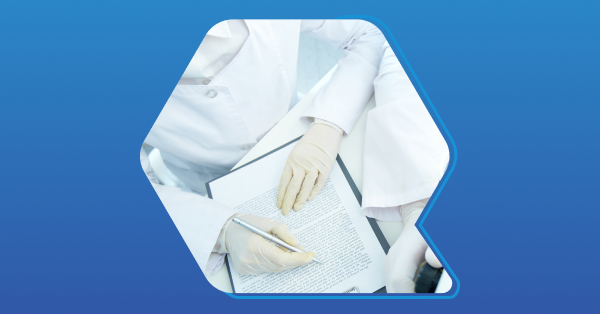5 Best Software Platforms for Lab Sample Management

Sample management is one of those lab processes that seems simple in theory, but in practice, it presents a challenge, especially for labs using outdated manual methods to track their data.
It’s not just time that gets lost.
For clinical labs, 80-90% of tests can impact patient safety, and surveyed laboratories report a 0.012-0.6% error rate, often caused by things like poor sample management, labeling, or storage.
How does your lab stack up? For instance, how confidently can you answer the following questions?
- Which samples are being tested right now?
- Where are they?
- At what stage in the testing process?
- What percentage has been corrupted and needs to be disposed of?
If these questions raise your heart rate a bit, you’re not alone. Many labs rely on one person to coordinate lab operations and relegate things like sample management to outdated tools that don’t scale (like spreadsheets).
In this guide, we’ll share the top software platforms available to help your lab modernize its sample management processes.
Why Proper Sample Management Matters
Proper sample management is more than an accurate record of what entered your lab. It helps ensure the following:
- Accurate and reliable results for your lab
- Efficiency and productivity
- Compliance with regulations and standards
- Resources in your lab are optimized
- You are following safety protocols
- Customer experience and confidence in your lab
Ignoring errors and inefficiencies in your lab’s sample management opens you up to a host of risks. Gaps and errors in your process can lead to:
- Compromised data quality: If samples are mislabeled, contaminated, or improperly stored, the data generated from those samples can be unreliable or invalid.
- Delays and inefficiencies: Mismanaged samples can lead to significant delays in laboratory workflows, reducing overall productivity and efficiency.
- Regulatory and compliance issues: Non-compliance with regulatory standards can lead to legal consequences, including fines and revocation of licenses.
- Increased costs: Errors in sample management can lead to repeated tests and increased operational costs.
- Loss of reputation: Inaccurate results due to poor sample management can damage a laboratory's reputation and credibility.
- Safety risks: Improper handling and disposal of samples, especially hazardous or bio-hazardous materials, can pose significant health and safety risks.
Fortunately, modern software available to labs can help overcome these challenges. Read on for a breakdown of what software to choose.
The Best Software Platform For Lab Sample Management
Say goodbye to Excel and hello to cloud-based software–but which platform will you choose?
There are two common types of platforms available to labs for sample management:
- ELN (Electronic Lab Notebook): An ELN functions as an electronic version of a lab notebook, allowing you to digitize and share lab records. While ELNs are primarily for notetaking and documentation, some ELNs do support sample management (to a degree).
- LIMS (Lab Information Management System): A LIMS is a comprehensive platform to manage your lab’s data. Think of it as a system of record for your lab: you can monitor inventory, manage samples, log test results, and integrate your lab instruments and other software platforms.
Between the two, a LIMS wins by a wide margin.
A LIMS is a much more comprehensive and complete platform for sample management than an ELN. But that’s not all a LIMS can do.
A LIMS is a powerhouse for inventory management, barcode scanning, reporting, and automating routine tasks and workflows. What’s more, for those looking to meet regulatory standards, your LIMS can integrate with or may have a built-in QMS for robust compliance support.
Now, which LIMS is best for modern labs looking to get more done? We’d recommend:
- QBench
- LabVantage
- LabWare
- Labguru
- Benchling
Let’s walk through each platform to help you decide which is right for your lab.
QBench
QBench is the leading option for labs of all sizes and many industries looking to get more done and scale.
Alongside robust sample management features, QBench takes a unique approach to LIMS by creating a highly configurable and flexible LIMS. This puts the power to make changes into your hands. Since all labs operate and evolve differently, they need a flexible LIMS that adapts with them over time. QBench releases software updates every three weeks, signaling a strong pace of improvements and innovation.
QBench is consistently voted among the best by its customers and wins top marks on G2. QBench has many accolades in G2’s Top LIMS Rankings, including:
- Best LIMS in North America in 2024
- Best usability for small businesses
- Best results for small businesses
And many more.
It’s not hard to see why – QBench is flexible enough to adapt to your unique workflows, even as they evolve, to eliminate laborious manual processes and outdated, cumbersome systems.
QBench stands out with its unparalleled flexibility and robust API, which are crucial features for labs in the fast-paced genomics industry. Its no-code, configurable workflows mean you can adjust processes, integrate new instruments, and adapt to regulatory changes swiftly. QBench laps the competition on the pace of product improvement by releasing frequent product updates, many of which are filled with new features that customers requested.
When you choose QBench, you're not just choosing a LIMS but a partnership that will grow with your lab.
LabVantage
LabVantage is a solid option for labs looking to get started with automation and streamlining their operations. LabVantage offers a cloud-based LIMS and ELN solution with sample management, inventory management, and reporting features among its broader feature set. Similar to LabWare, they excel at large, on-premises deployments and serving pharmaceutical companies.
LabVantage was founded in 1981 as Laboratory MicroSystems. It was sold in 1990 to Instron, which later sold the company to The Chatterjee Group in 1997. It is now believed to be owned by a combination of The Chatterjee Group, the private equity firm Bregal Sagemount, and Apollo Investment Corporation.
There’s a reason that QBench is a consistent leader across categories on G2; labs can get more done with QBench LIMS. Customers love QBench LIMS for its balance of simplicity with robust features, including:
- Configurable automations that give everyone on your team the ability to automate workflows without a line of code.
- API support that makes it easier than ever to bring your data all under one roof.
- Ease of use and fantastic support. QBench is fast and user-friendly, but any time you have a question, you can contact our support team for assistance.
LabWare
LabWare has been around since its founding in 1987 and boasts very high customer satisfaction.
They excel at on-premises deployments and serve many large pharmaceutical companies. The product is a solid option for larger companies looking to digitize their operations thanks to its built-in ELN and LIMS automation features. LabWare boasts a number of automation capabilities along with QA/QC features and instrument integrations. LabWare is customizable and even has its own programming language called LIMS Basic. The latest version of LabWare, LabWare 8, was released on June 12, 2020. LabWare has over 100 reviews on G2, with the majority of those coming from the pharmaceutical industry. They have an overall rating of 4.5/5 stars.
Labguru
Labguru is a great option for small labs looking to streamline and scale their operations. Its focus is on simplicity, ease of use, and user-friendliness.
Labguru is what we'd categorize as more ELN-forward (learn more about the difference between a LIMS and ELN) and focused on inventory management, but they do offer a LIMS alongside their ELN now. Previously, Labguru was owned by Holtzbrinck Publishing Group, a European publishing house. It is now owned by the buyout group (private equity arm) within Battery Ventures under their London-based Titian Software platform.
Like QBench, Labguru is well-reviewed on G2 with a 4.6/5 stars overall, 126 reviews of its ELN product, and 66 reviews of its LIMS product (as of January 2025).
Benchling
Like Labguru, Benchling is more of an ELN first with a LIMS added on (and it is one of the pricier options on our list).
While Benchling sports a robust set of features, especially those suited for biotech and R&D labs, labs looking for a more sophisticated LIMS may wish to check elsewhere on our list. Benchling is privately owned by 23 investors. Roughly 87% of its employees are in North America and 11% are in EMEA (according to LinkedIn). Benchling is well-reviewed on G2 with 4.5/5 stars.
Ready to Choose a LIMS? Download Our Free Buyer’s Guide
Modern labs need robust solutions for sample management that empower them to get more done, and do so while following compliance regulations.
If you’re ready to move beyond the manual grind of spreadsheets and select a LIMS to streamline sample management for your lab, then download our free LIMS Buyer’s Guide to help you choose the right LIMS for your lab. This guide will show you:
- The different types of LIMS available
- Key features to look for
- How to evaluate one and make the right choice for your lab
Click the button below to download the free buyer’s guide and take the first step toward improving your lab’s processes for sample management.






